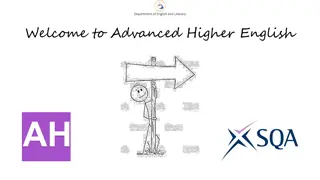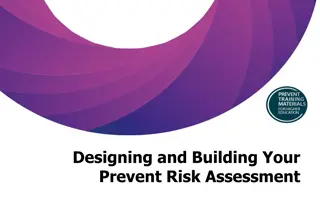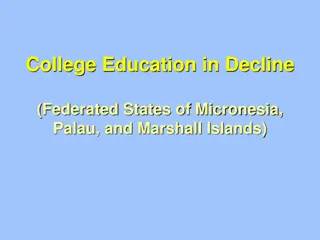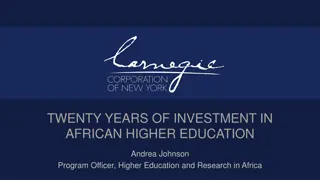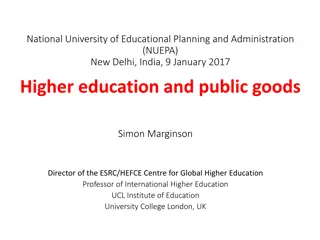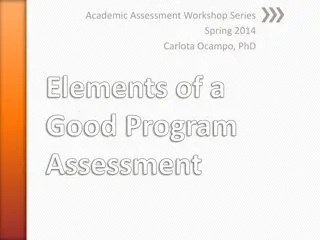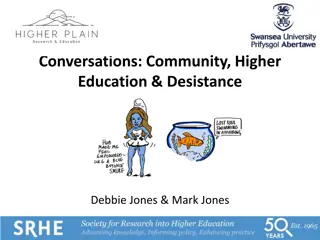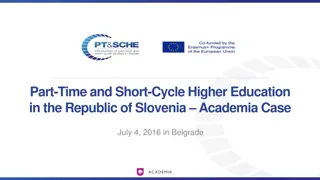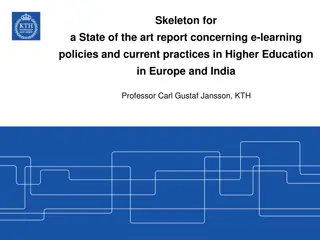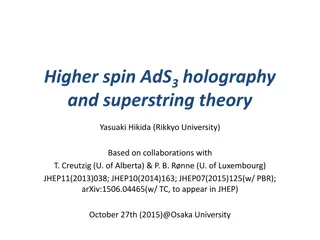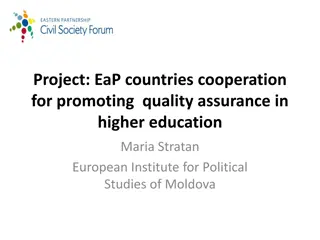Understanding Higher Education Assessment: The Complete Guide
Higher education assessment involves a systematic process of collecting, reviewing, and utilizing information to improve student learning and development. This guide covers the assessment cycle, learning outcomes, the mission behind assessment in higher education, what assessment is and is not, reasons for conducting assessments, and the role of assessment in student affairs. It emphasizes the importance of assessment for demonstrating contribution to the institution's mission, ensuring program quality, informing policies, and responding to external accountability.
Download Presentation

Please find below an Image/Link to download the presentation.
The content on the website is provided AS IS for your information and personal use only. It may not be sold, licensed, or shared on other websites without obtaining consent from the author. Download presentation by click this link. If you encounter any issues during the download, it is possible that the publisher has removed the file from their server.
E N D
Presentation Transcript
Assessment Cycle: From Start to Finish and Back to Start. P.S. It s a Cycle Emily Langdon Coordinator of Assessment, Research and Evaluation, Division of Student Affairs Student Affairs Professional Development Program Friday, September 25, 2015
Learning Outcomes for Today: Participants will be able to define assessment within the context of higher education; Participants will be able to describe the assessment planning cycle used by the Division of Student Affairs at UC Merced; Participants will be able identify the Student Affairs divisional Student Learning Outcomes. (p.s. There are 7 and there will be test, and a prize!)
What underpins higher education assessment? Mission of entire institution is to educate Holistic, integrated approach all contribute academic Institutional Mission & Strategic Academic Vision co-curricular (Student Affairs) administration
What is Assessment? The systematic collection, review, and use of information about educational programs undertaken for the purpose of improving student learning and development. The word assess comes from the Latin verb assidere meaning to sit with . (Palomba, C.A., & Banta, T.W. (1999). Assessment essentials: Planning, implementing, and improving assessment in higher education. San Francisco: Jossey-Bass.)
What Assessment Is Not Not performance evaluation Not testing Not research, which traditionally tests theories while assessment informs practice. Not summative, it s formative Not focused on individual or personal, it s focused on department and divisional level
Why do Assessment? Survival: Demonstrating contribution to UCM mission Quality: Ensuring programs and services are high quality Policy Development: Providing information to inform policies Politics:Responding to external questions of accountability Affordability: Prioritizing in tight fiscal environment Upcraft and Schuh, 1996 Mission: Research Universities value systematic inquiry
Assessment in Student Affairs Periodic Program Review (8 year cycle) Has your unit been through PR yet? All documents go to PROC for approval o o o Annual Assessment Planning and Reporting Assessment report and plan in Annual Report to IVCSA each June Returning to assessing our assessment with self-score, peer score and feedback loop. o o o Divisional Coordinated Assessment of SLO 14-15: Effective Communication 15-16: Leadership & Teamwork 16-17: Understanding & Appreciating Human Differences o o o o
Generic Assessment Cycle Define Outcome s Use to Improve Gather Evidence Interpret
SA Annual Assessment Planning Cycle Conclusions Goals Learning Outcomes Results Measures
PAIR & SHARE Rate your department on Commitment to Annual Assessment (high, medium, low very rigorous scale) What is one thing your department could do to improve the State of Assessment in your department?
SA Annual Assessment Planning Cycle Goal s Conclusions Learning Outcomes Results Measures
Student Learning Outcomes Student Learning Outcomes reveal the changes in attitudes, aptitudes or behaviors that a student user can describe or demonstrate after utilizing a service or program. (CSU, Sacramento) e.g. First year participants in the Emerging Leaders Program will report above average leadership abilities 10% higher than non-participant peers after their first year of college.
Another SLO Example Program Student Learning Outcome: As a result of the RA training program, all RAs write concise incident reports that are professional, include critical factual details, and use language that is non-judgmental. (Target 100%) Student Affairs Divisional Learning Outcome: Demonstrate effective written, verbal, and technological communication skills.
Divisional Student Learning Outcomes Civic Responsibility Communication Skills (2014-15) Confidence in One s Abilities Leadership and Teamwork (2015-16) Sense of Self and Impact on Others Appreciating Human Differences (2016-17) Life-long Learning and Personal Wellness
PAIR & SHARE: Which of these SLOs does your department most embrace or promote? Civic Responsibility Communication Skills Confidence in One s Abilities Leadership and Teamwork Life-long Learning and Personal Wellness Sense of Self and Impact on Others Understanding and Appreciating Human Differences
Program Outcomes Not everything we do is student learning. There are student services that need to happen to keep the trains running on time. These program objective, targets and outcomes are referred to as Organizational Effectiveness. e.g. Participation, Satisfaction, Efficiency, Key Performance Indicators.
How do we know we are successfully contributing to student learning? Your supervisor says, Great job! ?? You put it in your Statement of Accomplishments? Students write you thank you notes in May? You smile on your way home each day
SA Annual Assessment Planning Cycle Conclusions Goals Learning Outcomes Results Measures
Measures of SLO Student Learning Outcome: First year participants in the Emerging Leaders Program will report above average leadership abilities 10% higher after completion of the year-long program. Student Learning Outcome Measure: All first year students complete the First Year survey in October and a follow up survey in April which includes a self-report of leadership abilities.
PAIR & SHARE What is your RA s name? Does your RA know your name? Which of the Social Change Model values will you use the most in your leadership position? Define Consciousness of Self as used in the Social Change Model. WHAT EVIDENCE DOES YOUR UNIT COLLECT?
Measurement Strategies INDIRECT EVIDENCE: Proxy signs of learning, like student self-report of ability Surveys not ANOTHER survey!? Institutional-level survey data Department-level or program-specific surveys DIRECT EVIDENCE: Focus Groups or Interviews (SATAL) Rubric: Observation or review of student work or performance Evidence is all around us: from participation trends to student performance evaluations.
Campus Survey Coordination Returning to UCM bureaucracy, er, organization in 2016 PROC charged campus assessment subcommittee Committee will need 6 weeks lead time Repeat surveys are smooth sailing! Some are exempt, but surveys over 5% of any population need to be approved and scheduled e.g., 300 undergrads
Upcoming Assessment Sessions Quantitative Methods 11/20/15 Qualitative Methodology 2/26/16 Writing Good Learning Outcomes 4/29/16
SA Annual Assessment Planning Cycle Conclusions Goals Results Learning Outcomes Measures
Results from Leadership SLO Percentage who report Above Average in response to their current abilities First Year Survey, October Emerging Leaders Non-Participants Leadership Ability 84 82 Follow up Survey, April Emerging Leaders Non-Participants Leadership Ability 95 84
Results from Focus Group WHERE DID YOU PRACTICE EFFECTIVE COMMUNICATION SKILLS IN THE CO-CURRICULUM? As a Lead Peer Instructor, I have had to continuously learn ways to better communicate with my students about the lessons for the day. As an orientation leader coordinator, I have to know what is expected and communicate with the team. In SFAC deliberation. In both sports and Greek life, communication is key in order to get the job done. I learned a lot from HEROES when it comes to effective communication. Not only have I learned to communicate with staff and my peers but also with the student body.
SA Assessment Briefs Monthly mechanism for results sharing within Division. June & July share findings about Written and Verbal Effective Communication September: National Collegiate Healthy survey data October: New Student Profile You can provide results for November!
SA Annual Assessment Planning Cycle Conclusions Goals Learning Outcomes Results Measures
Conclusions An effective conclusion closes the loop by implementing change on the basis of results. Identify relevant implications of the data collection methods. Specific actions should be provided since the goal is continued improvement. Changes might address improvements to the assessment process in addition to services and programming.
Closing the Loop Shout it from the rooftops Revisit goals and objectives with results in mind apply your findings Allocate your resources accordingly Tweak unmet objectives
PAIR & SHARE What needs to happen or change to do more Closing of the Loop? What is ONE thing you can take back from today s discussion to your department to impact any step of the assessment cycle?
The A Team, for now Diana Chavez, CCPA Vernette Doty, OSL Kristin Hlubik, Health Promotion Other campus assessment resources Laura Martin, Assessment Coordinator SNS, SSHA & SoE School Assessment Coordinators Library, Administration Division ACs
Finally an assessment! 1. 2. 3. 4. 5. 6. 7.
AND we are Back to the Start! Emily Langdon Coordinator of Assessment, Research and Evaluation, Division of Student Affairs Student Affairs Professional Development Program Friday, September 25, 2015







